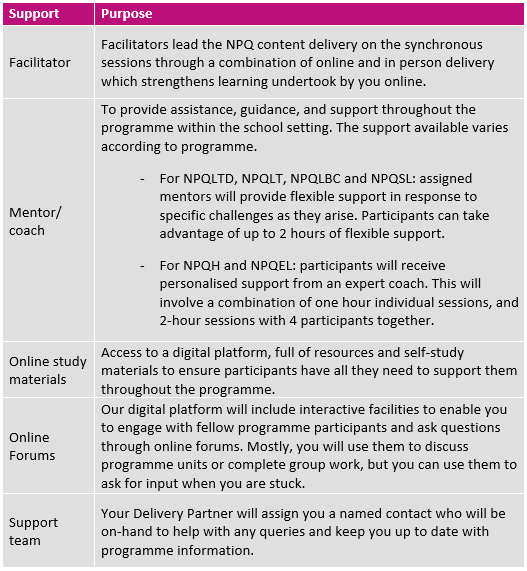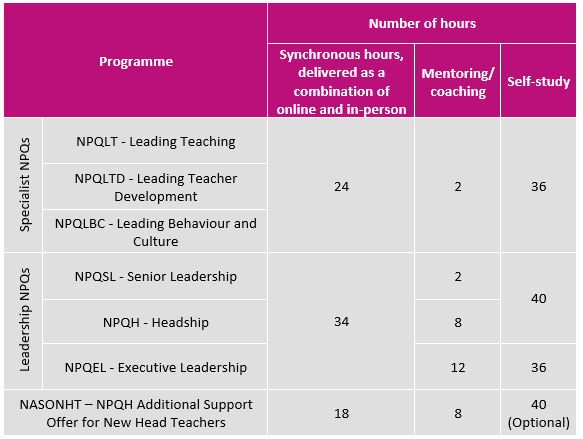- Home
- Our NPQ Programmes
- Participant FAQs
Participant FAQs
How are NPQs changing?
The new programme frameworks have been devised by the DfE in collaboration with teachers, school leaders, academics, and an Expert Advisory Group. All frameworks have passed through an independent review by the EEF to verify that they are evidence-based and that the evidence has been interpreted with fidelity. In contrast to the previous NPQs, the reformed suite of qualifications focuses more on the key domains of leadership that teachers and school leaders need to thrive and less on generic leadership styles. The reformed suite of qualifications includes:
- Three existing NPQs in Senior Leadership, Headship and Executive Leadership have been reformed to ensure they are underpinned by the latest and best evidence.
- The national professional qualification for middle leaders (NPQML) has ceased and there are three new NPQs which are specialist qualifications:
- NPQ for Leading Teaching (NPQLT).
- NPQ for Leading Behaviour and Culture (NPQLBC).
- NPQ for Leading Teacher Development (NPQLTD).
- Find out more about these qualifications here.
How do the new specialist qualifications differ from the NPQML?
The ‘NPQML’ has been discontinued and there are three new qualifications designed to develop specialist expertise in: ‘leading behaviour and culture’, ‘leading teacher development’ and ‘leading teaching’. This specialist focus will enable participants to undertake deep exploration of a specific leadership domain and schools to build capacity in a targeted area.
If there are COVID-19 related restrictions in place, will in-person delivery be postponed or delivered online?
All our synchronous content is designed to be delivered online or in-person so, if necessary, all sessions will be able to shift to online delivery and where possible the planned schedule will be maintained. Decisions to postpone sessions due to COVID-19 restrictions may be made at Delivery Partners discretion within parameters set by the DfE.
As there is no project, how will I be supported to apply my learning in school?
There is no longer an in-school project to complete alongside the training element of the programme. Instead, there is an open-book assessment in an eight-day set window within 3 months of programme completion requiring a structured 1500-word response to a real multi-resource scenario/case-study.
The programme will use ‘see it, name it, do it’ as an organisational structure for scaffolding learning to the point of mastery. This model will support you to apply your learning in school by following the cycle outlined below:
- See it: The approach goes beyond theory by using current, real-life models of exemplary practice.
- Name it: By identifying features of exemplary practice, the invisible is made visible. Participants reflect on their current practice and name their ‘gaps’.
- Do it: Participants are guided through implementation planning with time for practice, peer feedback and the use of gap tasks. As part of formative assessment, participants then ‘fix their gaps’ by applying their learning in school.
Opportunities to ‘do it’, through practice and planning give the best chance of successful implementation and lead to rapid school improvement, as well as providing regular practice opportunities for final scenario-based assessment.
How will I be supported throughout the NPQ?

How many learning hours should I expect?
The programmes are made up of a blend of synchronous and asynchronous components.

How do I apply?
The DfE have introduced a new process whereby applicants must register through the .GOV.UK website, then complete the School-Led Network application. Once you've chosen your programme and checked your suitability, register with the .GOV.UK website then complete the School-Led Network application form which can be found under on the top menus titled 'Apply now'.
